#Wellbeing economics
Explore tagged Tumblr posts
Text
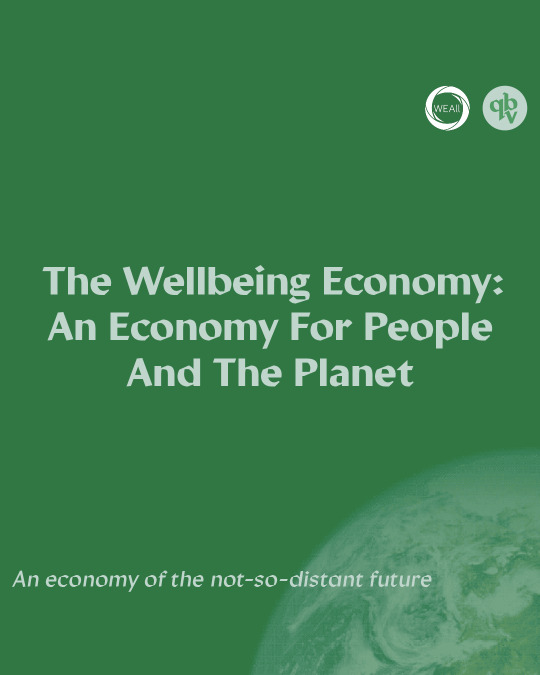
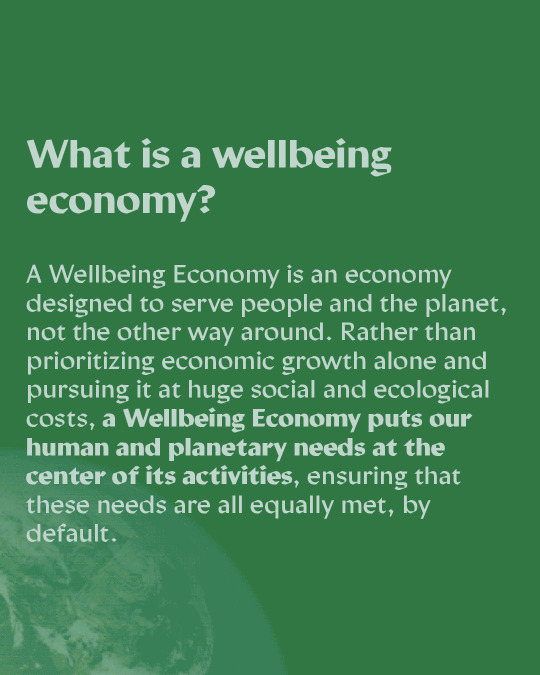
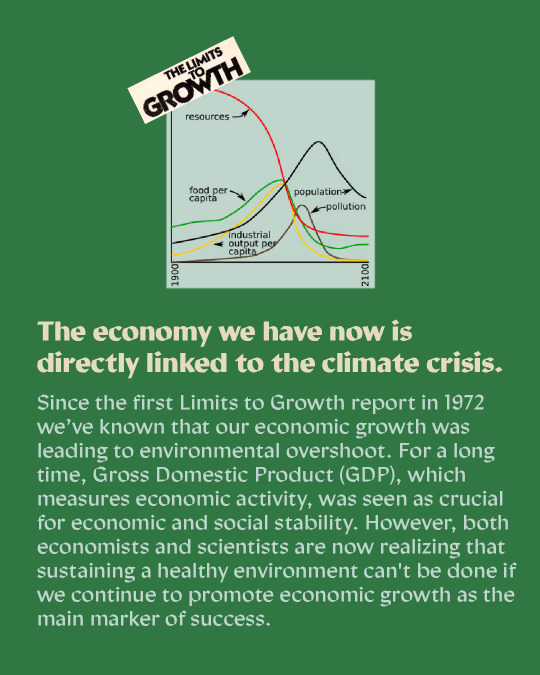
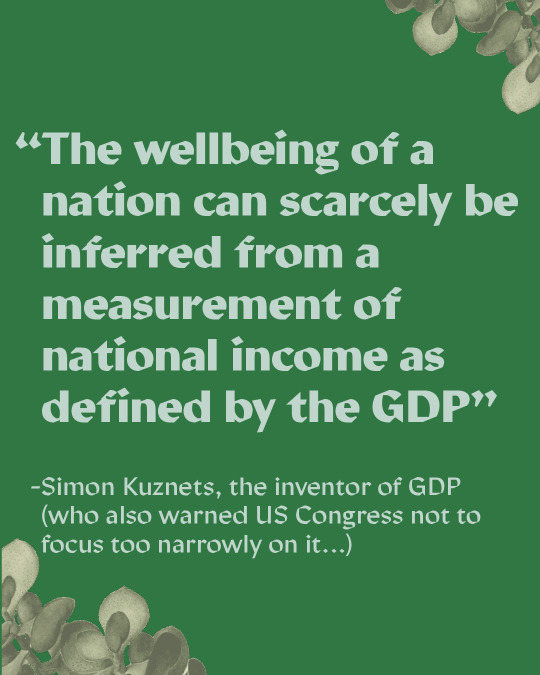
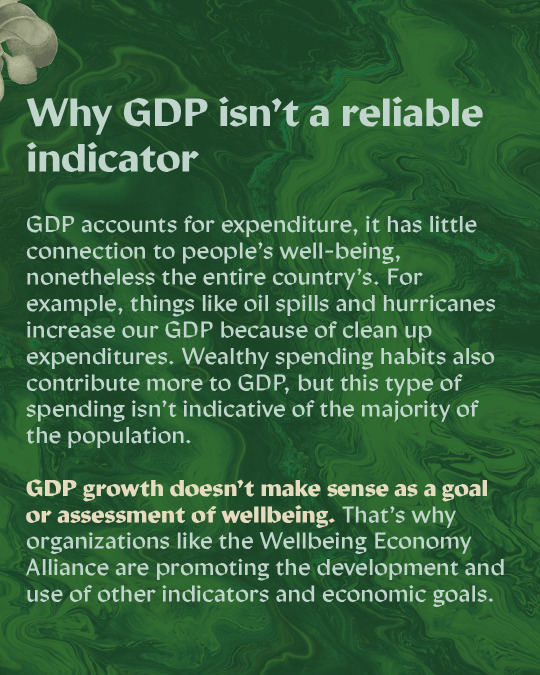
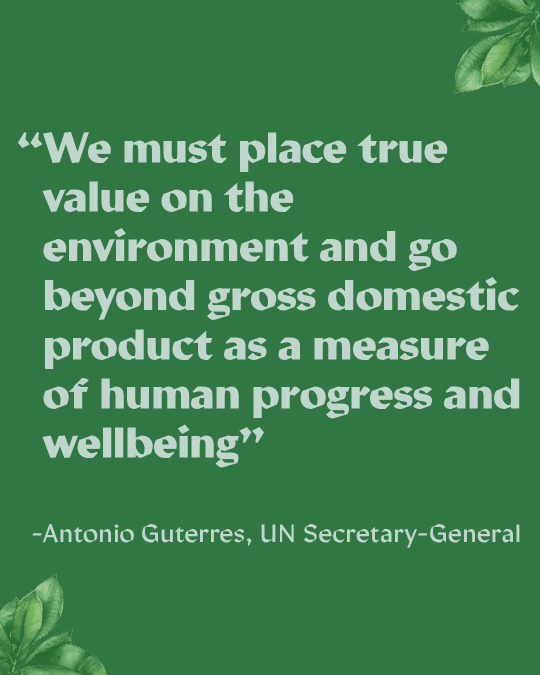
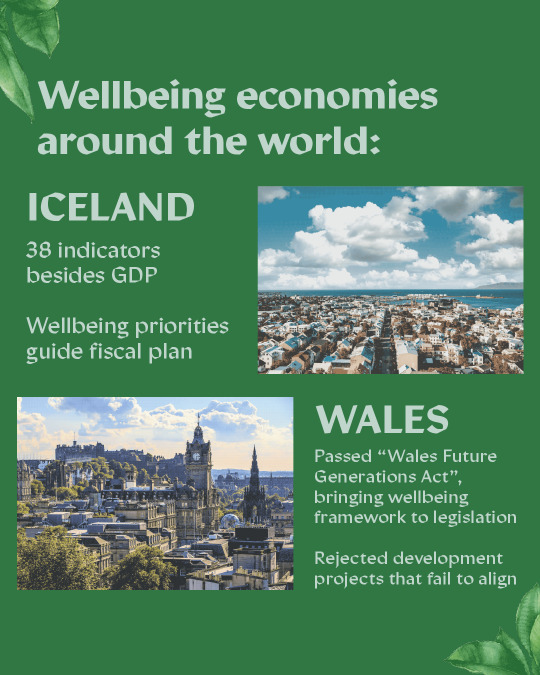
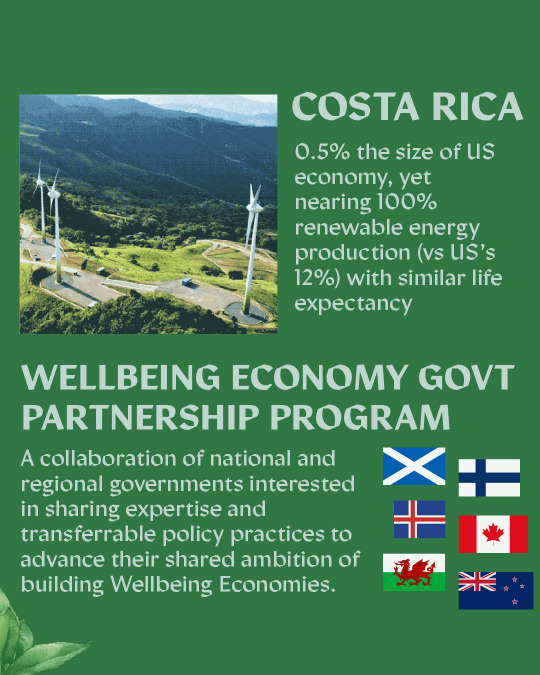
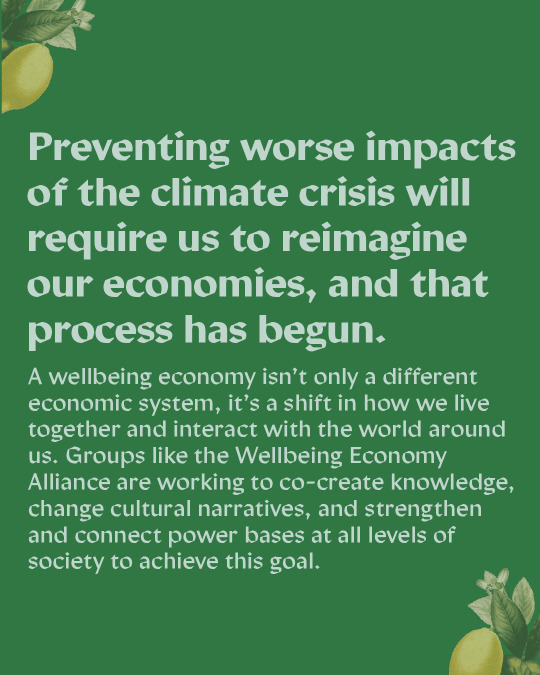
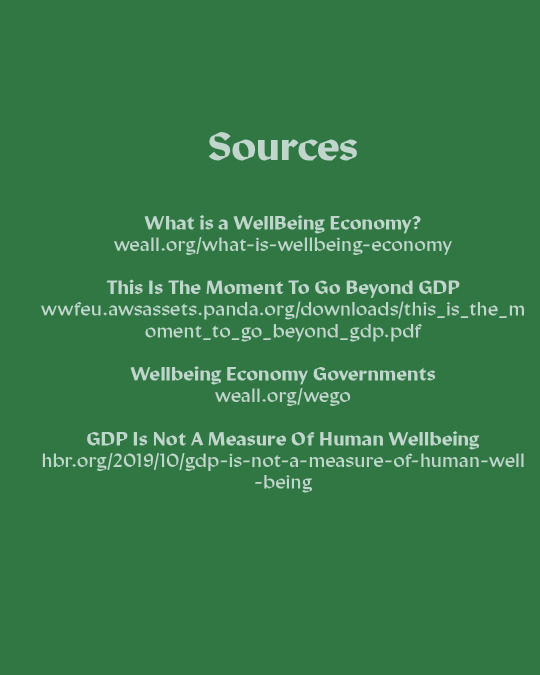
From my latest collaboration with the Wellbeing Economy Alliance! Their organization is dedicated to challenging economic growth as the only metric of wellbeing, because it fails to encompass so much.
Countries have started to enact goalposts for "wellbeing economies" which ask not only, "how will this contribute to economic growth?" but how will this help enrich people's lives and wellbeing? The changes have already been inspiring.
The key issue with GDP (which was never intended to be focused on so intently) is that it only accounts for spending. Why can't that be used as a metric? Things like oil spills positively contribute to GDP (more money spent on clean up), more hospital visits, virtually anything that requires money is "positive" for GDP. This metric also is biased toward rich people who spend exorbitantly more than the average person.
On our way to a sustainable future, wellbeing economies help provide a broader framework to make key decisions and measure social progress 🌞
Full post on my Instagram!
#queerbrownvegan#sustainability#climate change#environmentalism#environment#social justice#climate crisis#environmental justice#activism#intersectional environmentalism#economics#wellbeing#wellbeing economy
112 notes
·
View notes
Note
I know little about the stuff of states. What strings do you think could go with the US' military support to Ukraine? I am not asking for proof or evidence, just some examples of what the US could be asking Ukraine in turn.
alright so--it's important not to think of this conspiratorially. a lot of people, when they hear 'US aid has strings attached', imagine a shadowy figure on the phone with zelensky saying 'oh, we'll help you in this war... but you have to do something for us...'. but it is usually¹ more structural than that. for example, i think we can all agree that if ukraine were to unconditionally surrender to russia, that would be bad.
but there are a huge range of other conditions that could be pursued as prerequisites or preferences for a peace treaty--and when the US & friends make ukraine's military effort dependent on their continued support, and then publicly declare support for maximalist war aims like 'punishing' russia, reannexing crimea, or arresting putin, they incentivise the ukrainian state to pursue those goals militarily and diplomatically & strengthen the political capital of these maximalists and militarists within ukraine compared to more moderate factions.
then there is--of course--the fact that all the weapons and planes and so on given to the ukrainian military (including a lot of nazis!) aren't going to go anywhere. by putting them in the hands of a US-aligned government and their allies (which, again, include a lot of nazis), the US is materially strengthening that political wing in ukraine for decades to come no matter what the outcome of the war. like, influencing through resource provision in international politics rarely means 'giving people stuff to make them align with you'--rather, it means 'giving the people who already align with you stuff'.
so tldr: by provisioning the ukrainian state to fight this war and expressing specific policy goals wrt russia, the USA is de facto materially promoting those policy goals within the ukrainian government and military, as well as materially promoting the power & influence of said government and military over its citizens!
#¹ i say usually because especially with usamerican policy these types of exchanges keep actually happening#because us diplomats are often quite bad at their jobs#this is specifically about US military support by the way--in a lot of ways the IMF economic support should be just as concering-#-for anyone who cares about the wellbeing of the ukrainian people!#ask
94 notes
·
View notes
Text
Why Many Modern-Day Jobs are Detrimental or Useless to Society
In the contemporary world, a significant number of jobs have been criticized for being either detrimental or useless to society. This critique has been fueled by growing concerns about the negative impact certain professions have on individual well-being, the environment, and the overall social fabric. The concept of "bullshit jobs," popularized by anthropologist David Graeber, highlights the existence of jobs that contribute little to society while consuming time, energy, and resources. In this discussion, we'll explore why some modern-day jobs are viewed as detrimental or useless and examine the implications for individuals and society as a whole.
Detrimental Jobs: Harmful to Society and the Environment
Environmental Degradation:
Many jobs in industries like fossil fuels, fast fashion, and industrial agriculture are seen as detrimental due to their significant contributions to environmental degradation. These jobs often involve activities that harm ecosystems, contribute to climate change, and deplete natural resources. The environmental cost of these industries raises questions about their long-term sustainability and the moral justification for their continued existence.
Exploitation and Inequality:
Certain jobs are criticized for perpetuating exploitation and widening social inequality. This is particularly evident in low-wage, labor-intensive industries where workers endure poor working conditions, long hours, and minimal pay. The existence of such jobs reflects a system that prioritizes profit over human dignity, contributing to the perpetuation of poverty and social injustice.
Misallocation of Talent:
The financial sector, especially roles focused on speculation and high-frequency trading, is often cited as an example of jobs that misallocate human talent. While these roles may generate significant profits for individuals and corporations, they contribute little to the real economy or societal well-being. The focus on financial manipulation rather than productive innovation can lead to economic instability and undermine the broader social good.
Perpetuation of Harmful Industries:
Jobs in industries like tobacco, arms manufacturing, and junk food production are seen as detrimental because they perpetuate products and services that harm public health and safety. These jobs often exist in direct conflict with societal goals like reducing disease, promoting peace, and improving quality of life.
Useless Jobs: The "Bullshit Jobs" Phenomenon
Lack of Meaningful Contribution:
According to Graeber, a significant number of jobs exist that provide little to no meaningful contribution to society. These "bullshit jobs" include roles such as corporate bureaucrats, telemarketers, and certain types of middle management. Employees in these positions often feel that their work is pointless, leading to widespread dissatisfaction and a sense of alienation.
Artificial Job Creation:
In some cases, jobs are created not because they fulfill a societal need, but because of artificial demand generated by economic or corporate structures. For example, many administrative roles in large organizations may exist simply to manage complexity that could be avoided or streamlined. This creates a situation where resources are spent maintaining inefficiencies rather than addressing real societal challenges.
Psychological Impact:
The existence of useless jobs can have a profound psychological impact on workers. When people feel that their work lacks purpose or value, it can lead to stress, anxiety, and a decline in mental health. This, in turn, can reduce overall productivity and contribute to a broader sense of societal malaise.
Resource Waste:
Useless jobs consume valuable resources, including time, energy, and money, that could be better spent on addressing pressing social issues such as healthcare, education, and environmental conservation. The opportunity cost of maintaining such jobs is significant, as it diverts resources away from potentially transformative projects.
Implications for Society
Economic Inefficiency:
The proliferation of detrimental and useless jobs can lead to significant economic inefficiencies. When large portions of the workforce are engaged in activities that do not contribute to societal well-being or actively harm it, the overall productivity and resilience of the economy suffer.
Moral and Ethical Concerns:
The existence of such jobs raises important moral and ethical questions about the nature of work and its role in human life. Should jobs that harm the environment, exploit workers, or contribute little to society be allowed to continue? How do we balance economic growth with ethical considerations?
Need for a Paradigm Shift:
Addressing these issues may require a fundamental rethinking of our economic and social systems. This could involve redefining the concept of work, prioritizing jobs that contribute to the common good, and creating policies that encourage meaningful employment. A shift towards a more sustainable and equitable economy might involve promoting green jobs, supporting social enterprises, and investing in education and healthcare.
The critique of modern-day jobs as detrimental or useless highlights the need for a deeper examination of the role of work in society. As we face global challenges such as climate change, inequality, and social fragmentation, it is crucial to question whether our current economic structures are serving the greater good. By rethinking the types of jobs we value and prioritize, we can work towards a more just, sustainable, and meaningful future for all.
#philosophy#epistemology#knowledge#learning#chatgpt#education#economics#Modern Work#Bullshit Jobs#Environmental Impact#Economic Inefficiency#Workplace Exploitation#Meaningful Employment#Sustainability#Social Justice#David Graeber#Job Satisfaction#Societal Wellbeing
2 notes
·
View notes
Text
Hope & Happiness
I have spent much of my career as an economist studying the determinants of happiness in people in different countries and cultures around the world and, in turn, exploring how happiness affects important life outcomes such as work, health, longevity, and social life. While at first wellbeing was not considered the domain of economists, it is now a subfield in economics and includes collaboration with scholars in other disciplines, such as psychology, psychiatry, and the biological sciences as well...These are uncertain times. Given the damage that despair has already caused, including the prematurely lost lives of well over 100,000 Americans in 2021 alone, its spread to the next generation is a daunting thought. It is urgent that we expand our knowledge and put what we do know into practical policies. The science of wellbeing provides us with new tools to do so. Critical moments require radical new thinking on the importance of restoring hope.
Read more from Carol Graham.
Carol Graham is the interim vice president and director of economic studies at the Brookings Institution and College Park Professor at the University of Maryland. She is the author of Happiness around the World: The Paradox of Happy Peasants and Miserable Millionaires; The Pursuit of Happiness: An Economy of Well-Being; Happiness for All? Unequal Hopes and Lives in Pursuit of the American Dream (Princeton); and other books, as well as numerous articles in academic journals.
#Happiness#hope#health#science#DeathsofDespair#economics#MentalHealth#psychology#wellbeing#people#books
#Happiness#hope#health#science#DeathsofDespair#economics#MentalHealth#psychology#wellbeing#people#books
11 notes
·
View notes
Text
"Money does in fact buy happiness but only up to a certain salary" ---this has been updated with more data.
It appears that happiness does continue to increase with wealth, but it does so logarithmically, and the shallowing logarithmic curve is what looked like it going flat.
What this means is: the happiness that a person gets if they start with $1000 and gain another $100, is the same amount of happiness that a person gets if they start with $1,000,000,000 and gain another $100,000,000.
From which it follows that the total amount of happiness-as-a-function-of-wealth in the world always increases when money is taken off a rich person and given to a poor person.
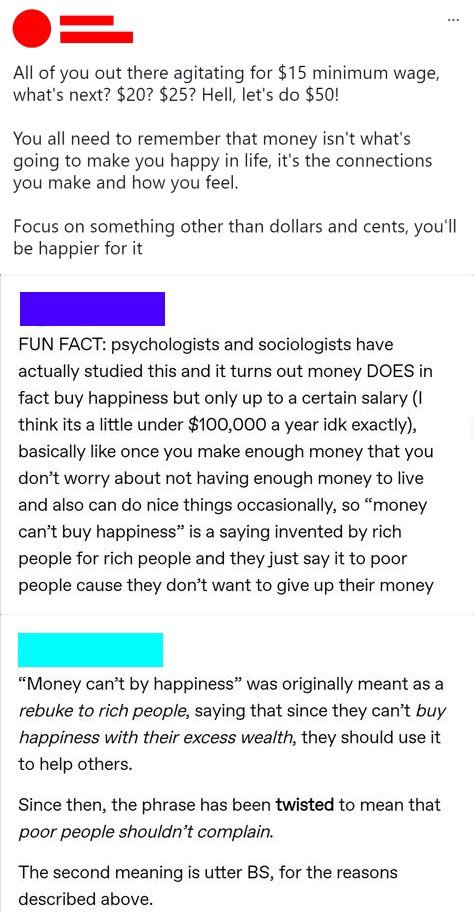
#happiness economics#this is possibly the deepest theoretical problem with neoliberal economic theory#which seeks to maximize mean wealth across the population#rather than mean happiness/wellbeing as a function of wealth#i can explain this if anyone wants me to but i would be threadjacking the post
29K notes
·
View notes
Text
Ignorant Indifferent Intelligence: Is It Artificial or Real?
Sometimes, it is very hard to understand certain minds, well, almost impossible. But there are clues. Psychology and psychiatry have certainly built a vast storehouse of knowledge about how people think about how they behave and how the way they live relates to others. But there is so much more, which is why we have social psychology. But it also answers just part of the puzzle too. Regarding…
#AI assistants#artificial intelligence#climate emergency#economic growth#humanity in Nature#illusion of exceptionalism#intelligence and emotion#Musk madness#normalization of trauma#saving democract#self control#social basis for beliefs#toxic culture#wellbeing economy
0 notes
Text
Lowkey why can’t we just put a cap on corporation’s profits?
Like, they can only charge X% more than the sum of material costs and labour costs (labour costs being the minimum wage of employees x time bcs I see folks arguing about that).
#ik atp basically all western governments are owned by corporations#and there’s all those problems with SEZ’s#but like if any politician actually cared for the wellbeing of their nation’s people then they’d implement something like this#probably. idk I don’t study economics#my post
0 notes
Text
How Local Communities Can Benefit from Eco-Tourism: A Sustainable Approach to Economic Growth
How Local Communities Can Benefit from Eco-Tourism: A Sustainable Approach to Economic Growth Introduction Eco-tourism is more than just a trend; it’s a powerful tool for sustainable development. As travelers become more conscious of their environmental impact, local communities stand to gain economically and socially by embracing eco-tourism. In this article, we’ll explore how eco-tourism can…

View On WordPress
#Community Development#Community Wellbeing#Cultural Preservation#Eco-Friendly Tourism#Eco-Tourism#Economic Growth#Environmental Conservation#Local Communities#Responsible Travel#Sustainable Tourism#Sustainable Travel#Tourism Benefits
0 notes
Text
Can Money Buy Happiness? New Insights from Wharton Professor Matthew Killingsworth
The never-ending debate about whether money can actually buy happiness has been going on for ages. As society changes and the economy evolves, it’s important to take another look at this question from new angles and modern research. Meet Matthew Killingsworth, a renowned professor at the Wharton School, whose latest research provides fresh and groundbreaking insights into this age-old…
#Economic Wellbeing#Financial Wellbeing#Happiness And Wealth#Happiness Economics#Happiness Equation#Happiness Factors#Happiness Research#Happiness Studies#Income And Happiness#Life Satisfaction#Matthew Killingsworth#Modern Happiness#Money And Happiness#Money Matters#Personal Fulfillment#Research Revealed#Wealth And Wellbeing#Wealth Impact#Wellbeing Science#Wharton Insights
0 notes
Text
5 Effective Ways to Successfully Quit Smoking
Tips toSuccessfully Quit Smoking Quitting smoking is no small feat. It demands perseverance, motivation, and a solid strategy. If you’re aiming to kick the habit for good, here are five effective ways to help you navigate the journey: Estimated reading time: 3 minutes Photo by George Morina on Pexels.com 1. Ask Yourself the Vital Question Begin with introspection. Frequently ask yourself,…
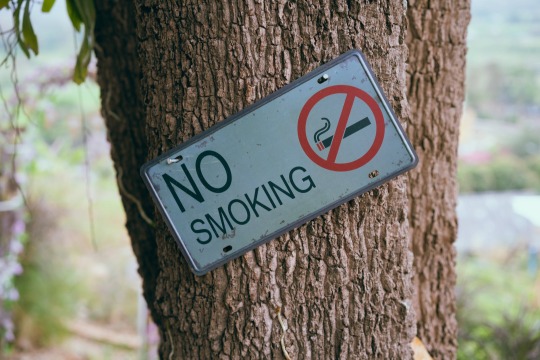
View On WordPress
#Economic Savings#Family Wellbeing#Health Benefits#Healthy Lifestyle#Quitting Tips#Self-motivation#Smoke-Free Life#Smoking Cessation
0 notes
Note
What I don't get is that other your support of AI image generation, you're SO smart and well read and concerned with ethics. I genuinely looked up to you! So, what, ethics for everyone except for artists, or what? Is animation (my industry, so maybe I care more than the average person) too juvenile and simplistic a medium for you to care about its extinction at the hands of CEOs endorsing AI? This might sound juvenile too, but I'm kinda devastated, because I genuinely thought you were cool. You're either with artists or against us imho, on an issue as large as this, when already the layoffs in the industry are insurmountable for many, despite ongoing attempts to unionize. That user called someone a fascist for pointing this out, too. I guess both of you feel that way about those of us involved in class action lawsuits against AI image generation software.
i can't speak for anyone else or the things they've said or think of anyone. that said:
1. you should not look up to people on the computer. i'm just a girl running a silly little blog.
2. i am an artist across multiple mediums. the 'no true scotsman' bit where 'artists' are people who agree with you and you can discount anyone disagrees with you as 'not an artist' and therefore fundamentally unsympathetic to artists will make it very difficult to actually engage in substantive discussion.
3. i've stated my positions on this many times but i'll do it one more: i support unionization and industrial action. i support working class artists extracting safeguards from their employers against their immiseration by the introduction of AI technology into the work flow (i just made a post about this funnily enough). i think it is Bad for studio execs or publishers or whoever to replace artists with LLMs. However,
4. this is not a unique feature of AI or a unique evil built into the technology. this is just the nature of any technological advance under capitalism, that it will be used to increase productivity, which will push people out of work and use the increased competition for jobs to leverage that precarity into lower wages and worse conditions. the solution to this is not to oppose all advances in technology forever--the solution is to change the economic system under which technologies are leveraged for profit instead of general wellbeing.
5. this all said anyone involved in a class action lawsuit over AI is an enemy of art and everything i value in the world, because these lawsuits are all founded in ridiculous copyright claims that, if legitimated in court, would be cataclysmic for all transformative art--a victory for any of these spurious boondoggles would set a precedent that the bar for '''infringement''' is met by a process that is orders of magnitude less derivative than collage, sampling, found art, cut-ups, and even simple homage and reference. whatever windmills they think they are going to defeat, these people are crusading for the biggest expansion of copyright regime since mickey mouse and anyone who cares at all about art and creativity flourishing should hope they fail.
2K notes
·
View notes
Text
The Great Battle: Economic Growth vs. Human Wellbeing
Image credit: NBC News. This post was first published on my new Substack platform, Illusions Transformed. The idea that economic growth is the road to progress is so ingrained in the minds of we ‘moderns’ that the growing disconnect between capital accumulation and human wellbeing is hardly noticed. Yes, we know about poverty, but the pitch of my Econ 101 teacher in 1964 still sticks: “A rising…
#autocratic attempt#Billionaire addiction to power#climate denial#corporate state#ecological civilization#economic growth#great societal transformation#MAGA extremism#societal collapse#system destabilization#trickle down economy failure#Trump and Musk#unconstitutional DOGA#wellbeing economy
0 notes
Text
Gandersauce

I'm on a 20+ city book tour for<p>placehold://://er </p> my new novel PICKS AND SHOVELS. Catch me in AUSTIN on MONDAY (Mar 10). I'm also appearing at SXSW and at many events around town, for Creative Commons and Fediverse House. More tour dates here.

It's true that capitalists by and large hate capitalism – given their druthers, entrepreneurs would like to attain a perch from which they get to set prices and wages and need not fear competitors. A market where everything is up for grabs is great – if you're the one doing the grabbing. Less so if you're the one whose profits, customers and workers are being grabbed at.
But while all capitalists hate all capitalism, a specific subset of capitalists really, really hate a specific kind of capitalism. The capitalists who hate capitalism the most are Big Tech bosses, and the capitalism they hate the most is techno-capitalism. Specifically, the techno-capitalism of the first decade of this century – the move fast/break things capitalism, the beg forgiveness, not permission capitalism, the blitzscaling capitalism.
The capitalism tech bosses hate most of all is disruptive capitalism, where a single technological intervention, often made by low-resourced individuals or small groups, can upend whole industries. That kind of disruption is only fun when you're the disruptor, but it's no fun for the disruptees.
Jeff Bezos's founding mantra for Amazon was "your margin is my opportunity." This is a classic disruption story: I'm willing to take a smaller profit than the established players in the industry. My lower prices will let me poach their customers, so I grow quickly and find more opportunities to cut margins but make it up in volume. Bezos described this as a flywheel that would spin faster and faster, rolling up more and more industries. It worked!
https://techcrunch.com/2016/09/10/at-amazon-the-flywheel-effect-drives-innovation/
The point of that flywheel wasn't the low prices, of course. Amazon is a paperclip-maximizing artificial intelligence, and the paperclip it wants to maximize is profits, and the path to maximum profits is to charge infinity dollars for things that cost you zero dollars. Infinite prices and nonexistent wages are Amazon's twin pole-stars. Amazon warehouse workers don't have to be injured at three times the industry average, but maiming workers is cheaper than keeping them in good health. Once Amazon vanquished its competitors and captured the majority of US consumers, it raised prices, and used its market dominance to force everyone else to raise their prices, too. Call it "bezosflation":
https://pluralistic.net/2023/04/25/greedflation/#commissar-bezos
We could disrupt Amazon in lots of ways. We could scrape all of Amazon's "ASIN" identifiers and make browser plugins that let local sellers advertise when they have stock of the things you're about to buy on Amazon:
https://pluralistic.net/2022/07/10/view-a-sku/
We could hack the apps that monitor Amazon drivers, from their maneuvers to their eyeballs, so drivers had more autonomy and their bosses couldn't punish them for prioritizing their health and economic wellbeing over Amazon's. An Amazon delivery app mod could even let drivers earn extra money by delivering for Amazon's rivals while they're on their routes:
https://pluralistic.net/2023/04/12/algorithmic-wage-discrimination/#fishers-of-men
We could sell Amazon customers virtual PVRs that let them record and keep the shows they like, which would make it easier to quit Prime, and would kill Amazon's sleazy trick of making all the Christmas movies into extra-cost upsells from November to January:
https://www.amazonforum.com/s/question/0D54P00007nmv9XSAQ/why-arent-all-the-christmas-movies-available-through-prime-its-a-pandemic-we-are-stuck-at-home-please-add-the-oldies-but-goodies-to-prime
Rival audiobook stores could sell jailbreaking kits for Audible subscribers who want to move over to a competing audiobook platform, stripping Amazon's DRM off all their purchases and converting the files to play on a non-Amazon app:
https://pluralistic.net/2022/07/25/can-you-hear-me-now/#acx-ripoff
Jeff Bezos's margin could be someone else's opportunity…in theory. But Amazon has cloaked itself – and its apps and offerings – in "digital rights management" wrappers, which cannot be removed or tampered with under pain of huge fines and imprisonment:
https://locusmag.com/2020/09/cory-doctorow-ip/
Amazon loves to disrupt, talking a big game about "free markets and personal liberties" – but let someone attempt to do unto Amazon as Amazon did unto its forebears, and the company will go running to Big Government for a legal bailout, asking the state to enforce its business model:
https://apnews.com/article/washington-post-bezos-opinion-trump-market-liberty-97a7d8113d670ec6e643525fdf9f06de
You'll find this cowardice up and down the tech stack, wherever you look. Apple launched the App Store and the iTunes Store with all kinds of rhetoric about how markets – paying for things, rather than getting them free through ads – would correct the "market distortions." Markets, we were told, would produce superior allocations, thanks to price and demand signals being conveyed through the exchange of money for goods and services.
But Apple will not allow itself to be exposed to market forces. They won't even let independent repair shops compete with their centrally planned, monopoly service programs:
https://pluralistic.net/2022/05/22/apples-cement-overshoes/
Much less allow competitors to create rival app stores that compete for users and apps:
https://pluralistic.net/2024/02/06/spoil-the-bunch/#dma
They won't even refurbishers re-sell parts from phones and laptops that are beyond repair:
https://www.shacknews.com/article/108049/apple-repair-critic-louis-rossmann-takes-on-us-customs-counterfeit-battery-seizure
And they take the position that if you do manage to acquire a donor part from a dead phone or laptop, that it is a felony – under the same DRM laws that keep Amazon's racket intact – to install them in a busted device:
https://www.theverge.com/2024/3/27/24097042/right-to-repair-law-oregon-sb1596-parts-pairing-tina-kotek-signed
"Rip, mix, burn" is great when it's Apple doing the ripping, mixing and burning, but let anyone attempt to return the favor and the company turns crybaby, whining to Customs and Border Patrol and fed cops to protect itself from being done unto as it did.
Should we blame the paperclip-maximizing Slow AI corporations for attempting to escape disruptive capitalism's chaotic vortex? I don't think it matters: I don't deplore this whiny cowardice because it's hypocritical. I hate it because it's a ripoff that screws workers, customers and the environment.
But there is someone I do blame: the governments that pass the IP laws that allow Apple, Google, Amazon, Microsoft and other tech giants shut down anyone who wants to disrupt them. Those governments are supposed to work for us, and yet they passed laws – like Section 1201 of the Digital Millennium Copyright Act – that felonize reverse-engineering, modding and tinkering. These laws create an enshittogenic environment, which produces enshittification:
https://pluralistic.net/2024/05/24/record-scratch/#autoenshittification
Bad enough that the US passed these laws and exposed Americans to the predatory conduct of tech enshittifiers. But then the US Trade Representative went slithering all over the world, insisting that every country the US trades with pass their own versions of the laws, turning their citizens into an all-you-can-steal buffet for US tech gougers:
https://pluralistic.net/2020/07/31/hall-of-famer/#necensuraninadados
This system of global "felony contempt of business-model" statutes came into being because any country that wanted to export to the USA without facing tariffs had to pass a law banning reverse-engineering of tech products in order to get a deal. That's why farmers all over the world can't fix their tractors without paying John Deere hundreds of dollars for each repair the farmer makes to their own tractor:
https://pluralistic.net/2022/05/08/about-those-kill-switched-ukrainian-tractors/
But with Trump imposing tariffs on US trading partners, there is now zero reason to keep those laws on the books around the world, and every reason to get rid of them. Every country could have the kind of disruptors who start a business with just a little capital, aimed directly at the highest margins of these stupidly profitable, S&P500-leading US tech giants, treating those margins as opportunities. They could jailbreak HP printers so they take any ink-cartridge; jailbreak iPhones so they can run any app store; jailbreak tractors so farmers can fix them without paying rent to Deere; jailbreak every make and model of every car so that any mechanic can diagnose and fix it, with compatible parts from any manufacturer. These aren't just nice things to do for the people in your country's borders: they are businesses, massive investment opportunities. The first country that perfects the universal car diagnosing tool will sell one to every mechanic in the world – along with subscriptions that keep up with new cars and new manufacturer software updates. That country could have the relationship to car repairs that Finland had to mobile phones for a decade, when Nokia disrupted the markets of every landline carrier in the world:
https://pluralistic.net/2025/03/03/friedmanite/#oil-crisis-two-point-oh
The US companies that could be disrupted thanks to the Trump tariffs are directly implicated in the rise of Trumpism. Take Tesla: the company's insane valuation is a bet by the markets that Tesla will be able to charge monthly fees for subscription features and one-off fees for software upgrades, which will be wiped out when your car changes hands, triggering a fresh set of payments from the next owner.
That business model is entirely dependent on making it a crime to reverse-engineer and mod a Tesla. A move-fast-and-break-things disruptor who offered mechanics a tool that let them charge $50 (or €50!) to unlock every Tesla feature, forever, could treat Musk's margins as their opportunity – and what an opportunity it would be!
That's how you hurt Musk – not by being performatively aghast at his Nazi salutes. You kick that guy right in the dongle:
https://pluralistic.net/2025/02/26/ursula-franklin/#franklinite
The act of unilaterally intervening in a market, product or sector – that is, "moving fast and breaking things" – is not intrinsically amoral. There's plenty of stuff out there that needs breaking. The problem isn't disruption, per se. Don't weep for the collapse of long-distance telephone calls! The problem comes when the disruptor can declare an end to history, declare themselves to be eternal kings, and block anyone from disrupting them.
If Uber had been able to nuke the entire taxi medallion system – which was dominated by speculators who charged outrageous rents to drivers – and then been smashed by driver co-ops who modded gig-work apps to keep the fares for themselves, that would have been amazing:
https://pluralistic.net/2022/02/21/contra-nihilismum/#the-street-finds-its-own-use-for-things
The problem isn't disruption itself, but rather, the establishment of undisruptable, legally protected monopolies whose crybaby billionaire CEOs never have to face the same treatment they meted out to the incumbents who were on the scene when they were starting out.
We need some disruption! Their margins are your opportunity. It's high time we started moving fast and breaking US Big Tech!

If you'd like an essay-formatted version of this post to read or share, here's a link to it on pluralistic.net, my surveillance-free, ad-free, tracker-free blog:
https://pluralistic.net/2025/03/08/turnabout/#is-fair-play
#pluralistic#move fast and break things#disruption#big tech#monopolism#antitrust#ip#anticircumvention#trumpism#tariffs#your margin is my opportunity
385 notes
·
View notes
Text
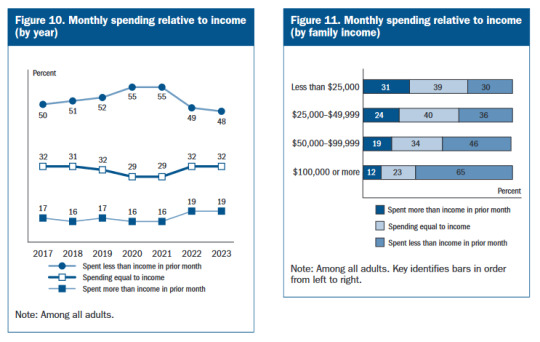
if we're like, showing graphs and stuff, this is the type that i think a lot of people on tumblr are thinking of when they think about the economy.
Only one third of people with family incomes below $50k spent less than their income each month. I would guess that a lot of people on tumblr who get aggro about this topic (and the vast majority of people on r/povertyfinance, who discuss this sort of thing a lot) fall into this earning category.
Real wage increases only matter if you got a raise (one third of workers got a raise last year, which means that 2/3rds didn't - included in the economic wellbeing report linked above). Whether or not rent is outpacing wages only matters if you're not going to be rent burdened (more than a third of renter households are cost burdened in every state and 12 million rental households spend more than half their income on rent). Employment rates lose a lot of meaning when you're working multiple jobs to make ends meet (the percentage of multiply employed workers was falling in the US from 1996 to the 2010s, when it plateaued, then it started rising slightly then collapsed in 2020 and has been rising steeply since then and it's too soon to tell if it's going to go back to the plateau or keep going up).
Four in ten adults in the US is carrying some level of medical debt (even people who are insured) and 60% of people with medical debt have cut back on food, clothes or household items; about 50% of people with medical debt have used up all their savings.
Tumblr is the broke people website and yeah, people who are working two jobs to afford $900 for one room and utilities in a three bedroom apartment are not going to feel great about the economy even if real wages are raising and inflation-adjusted rents are actually pretty stable. "The Rent is too Damn High" has been a meme for 14 years so, like, yeah. Even if it's pretty stable when adjusted for inflation it is stable and HIGH.
It's hard to feel good about the economy when you're spending the last few days of the pay period hoping nothing unexpected hits your account, and it's VERY frustrating to be told that the economy's doing well when you've had to start selling blood to buy groceries.
Sure, unemployment is low, that's neat. It's good that inflation has stabilized (it genuinely has; prices are not likely to fall back to pre-inflation rates and eventually you'll likely be paid enough to reach equilibrium, but a lot of people aren't there yet).
But, like, it costs eight thousand dollars a year out of pocket to keep my spouse alive. I'd guess that we've paid off about a third of the 40-ish thousands of dollars he's racked up since his heart attack. His medical debt is why I don't have a retirement plan beyond "I guess I'll die?" So talking about how good the economy is kind of feels like being chained in the bottom of a pit that is slowly filling with water while people on the surface talk about the fact that the rain is tapering off. Neat! That's good! But I can't really see it from where I'm standing.
Inflation really is getting better. My state just enacted a $20 minimum wage for fast food workers. The Biden administration has worked hard to reduce many kinds of healthcare costs. A lot of people have had significant portions of their student debt cancelled.
But a lot of people are still having trouble affording groceries and it doesn't seem helpful to say "your perception of the economy is decoupled from the reality of the economy" on the "can I get a few dollars for food today?" website.
560 notes
·
View notes
Text
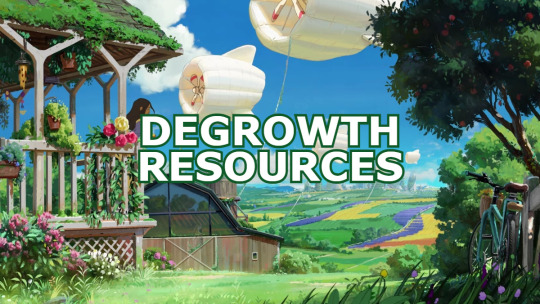
Degrowth basics
"The word degrowth stands for a family of political-economic approaches that, in the face of today’s accelerating planetary ecological crisis, reject unlimited, exponential economic growth as the definition of human progress."
What is Degrowth? | Caracol DSA
Why degrowth is the only responsible way forward | OpenDemocracy
Degrowth and MMT: A thought experiment
We Need A Fair Way To End Infinite Growth | Current Affairs
Degrowth: A Call for Radical Abundance | Common Dreams
Can degrowth save us and the planet? | Nottingham Trent
Defending limits is not Malthusian | Undisciplined Environments
Can We Have Prosperity Without Growth? | New Yorker
The Urgent Case for Shrinking the Economy | The New Republic
Giving Up on Economic Growth Could Make Us Cooler and Happier | The New Republic
A guide to degrowth: The movement prioritizing wellbeing in a bid to avoid climate cataclysm | CNBC
What is ‘degrowth’ and how can it fight climate change? | Popular Science
Enough for Everyone | Yes! Magazine
Toward a Post-Capitalist Future: On the Growth of “Degrowth” | Lit Hub
All we are saying is give degrowth a chance | The RSA
A pathway out of environmental collapse | newsroom
On Technology and Degrowth | Monthly Review
What is degrowth (and more importantly, what is it not)? | META
Green growth
"There is no empirical evidence that absolute decoupling from resource use can be achieved on a global scale against a background of continued economic growth."
Is Green Growth Possible? | Jason Hickel & Giorgos Kallis
The Myth of America’s Green Growth | Foreign Policy
The decoupling delusion: rethinking growth and sustainability | The Conversation
Is green growth happening? | Uneven Earth
Green Growth | Uneven Earth
The Delusion of Infinite Economic Growth | Scientific American
Degrowth is not austerity – it is actually just the opposite | Al Jazeera
A response to Paul Krugman: Growth is not as green as you might think | Timothée Parrique
Deceitful Decoupling: Misconceptions of a Persistent Myth | Alevgul H. Sorman
Degrowth isn’t the same as a recession – it’s an alternative to growing the economy forever | The Conversation
Degrowth and the left
"In the middle of an ecological emergency, should we be producing sport utility vehicles and mansions? Should we be diverting energy to support the obscene consumption and accumulation of the ruling class?"
The Left should embrace degrowth | New Internationalist
Ecosocialism is the Horizon, Degrowth is the Way | The Trouble
Degrowth: Socialism without Growth | Brave New Europe
Toward an Ecosocialist Degrowth: From the Materially Inevitable to the Socially Desirable | Monthly Review
For an Ecosocialist Degrowth | Monthly Review
Degrowth and Revolutionary Organizing | Rosa Luxemburg NYC
The necessity of ecosocialist degrowth | Rupture
Degrowth is Anti-Capitalist | Protean Mag
Degrowth Communism | PPPR (Part one | Part two | Part three)
Economic Planning and Degrowth: How Socialism Survives the 21st Century | New Socialist
Degrowth and the South
"Southern countries should be free to organize their resources and labor around meeting human needs rather than around servicing Northern growth."
Who is afraid of degrowth? A Global South economic perspective | IBON Foundation
The anti-colonial politics of degrowth | Jason Hickel
Unlearning: From Degrowth to Decolonization | Rosa Luxemburg NYC
Degrowth requires the Global South to default on its foreign debts | Resilience
Journals/Reports
Degrowth: a theory of radical abundance | Jason Hickel
A systematic review of the evidence on decoupling of GDP, resource use and GHG emissions, part II: synthesizing the insights
What does degrowth mean? A few points of clarification | Jason Hickel
Providing decent living with minimum energy: A global scenario | Global Environmental Change
Urgent need for post-growth climate mitigation scenarios | Nature Energy
Degrowth and critical agrarian studies | Julien-François Gerber
Decoupling debunked – Evidence and arguments against green growth as a sole strategy for sustainability | European Environmental Bureau
Incrementum ad Absurdum: Global Growth, Inequality and Poverty Eradication in a Carbon-Constrained World | David Woodward
Degrowth can work — here’s how science can help | Nature
A New Political Economy for a Healthy Planet | Jason Hickel
Planning beyond growth. The case for economic democracy within limits
Millionaire spending incompatible with 1.5 °C ambitions | Cleaner Production Letters
Is green growth happening? An empirical analysis of achieved versus Paris-compliant CO2–GDP decoupling in high-income countries | The Lancet
Books
Exploring Degrowth: A Critical Guide | Pluto Press
A People's Green New Deal | Max Ajl
Less is More: How Degrowth Will Save the World | Jason Hickel
Breaking Things at Work: The Luddites Are Right About Why You Hate Your Job | Verso Books
The Future is Degrowth: A Guide to a World Beyond Capitalism | Verso Books
The Imperial Mode of Living: Everyday Life and the Ecological Crisis of Capitalism | Verso Books
Marx in the Anthropocene: Towards the Idea of Degrowth Communism | Kohei Saito
Degrowth & Strategy: how to bring about social-ecological transformation
27 Essays and Thoughts on Degrowth | Giorgos Kallis
Videos
Yes To Limits To Growth! | The Other School
How Degrowth Can Save the World | Andrewism
How We End Consumerism | Our Changing Climate
Demystifying Degrowth | Rosa Luxemburg NYC
Degrowth is not Austerity | John the Duncan
Degrowth and Ecosocialism | Planet: Critical
Degrowth in 7 minutes: Fighting for climate by living better | Think That Through
The Future is Degrowth (w/ Aaron Vansintjan) || SRSLY WRONG
"Degrowth means power to the working class!"with Jason Hickel | GND Media
Others
degrowth.info
Degrowth Journal
Doughnut Economics
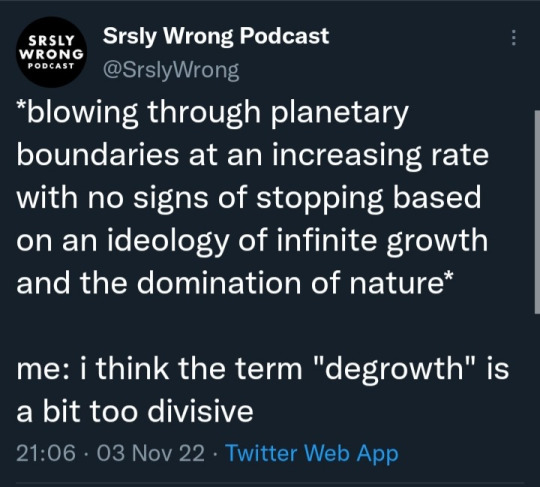
3K notes
·
View notes
Text
Writing Notes: Life Domains
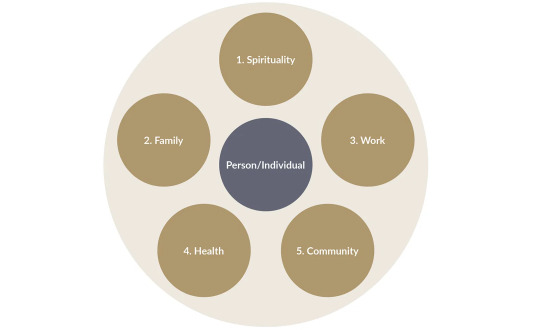
There are a great number of divisions and domains in life (Rojas, 2006; Cummins, 2003; Headey & Wearing, 1992; Veenhoven, 1996), encompassing anywhere from a small range to the infinite possibilities of human activities and areas of being (Rojas, 2006).
Vanderweele (2017) generally suggests that there are 5 domains of human life that should be focused on to promote human flourishing:
Spirituality. This area of life should be prioritized but is often neglected (Moberg & Brusek, 1978). Although the words religion and spirituality are often used interchangeably, a person does not have to practice a faith to be spiritual (Mercadante, 2014). Spirituality enables a purpose in life and dictates how someone may think, feel, and behave to allow them to gain fulfillment (Mercadante, 2014). Spirituality is based on an individual’s principles and focuses on creating a good life for themselves (Dierendonck, 2011). When a person’s actions are not in line with their spiritual beliefs, this can cause an imbalance within this life domain.
Family. An essential but influential domain. Family does not have to be biological. More importantly, it relates to people with whom you have a meaningful relationship (Robins & Tomanec, 1962). The family domain is an area of life that can become imbalanced when a person’s roles and responsibilities are not being fulfilled. This may be because another domain is receiving more attention, such as work (Rao & Indla, 2010). It may be that the beliefs, values, and behaviors of the person are not in line with other family members. When this domain is imbalanced, it results in fractured relationships, estrangement, and separations (Olah, Kotowska, & Richter, 2018).
Work. Plays a fundamental part in the life of most adults throughout all societies. It has an economic and instrumental role because it provides a livelihood (Scoones, 2009). Work provides a will to learn, develop, and accomplish goals. Work also has a psychosocial aspect. It gives meaning to an individual’s life and satisfies their need to be part of society (Sharabi & Harpaz, 2007). It is important that people enjoy what they are doing, where they are working, and who they are working with. If an individual is investing too much time in this domain to the detriment of other domains, it may cause an imbalance.
Health. This domain concerns physical, emotional, and mental health and wellbeing. Individuals can learn how to develop a healthy lifestyle from an early age through education (Cutler & Lleras-Muney, 2014). Physical health can deteriorate from work stress and financial demands. Poor health can affect independent living and the ability to work and engage with family members and the community. This can be detrimental to positive emotional and mental health and wellbeing (Wong, Chan, & Ngan, 2019). It is essential to adopt a healthy lifestyle and promote healthy living. Understanding how to exercise, eat healthily, relax, and connect spiritually helps to promote overall health.
Community. Relationships outside the family are essential (Darling, Hamilton, & Shaver, 2003). These can be with friends or specific communities, such as the neighborhood community, faith or sports-based interests, or hobbies that allow a person to develop a sense of belonging with others (Darling et al., 2003). Community allows people to be united and, like family, allows a sense of safety and security (Bowe et al., 2020). It provides a sense of achievement and fulfillment, especially when an individual is working toward a shared community goal, such as raising money for a good cause or helping others within the community (Bowe et al., 2020). Nevertheless, spending too much time with the community and neglecting other domains, such as family, can cause an imbalance.
This is a simple and easy-to-understand model that illustrates the main life domains recognized by most people. Vanderweele's interpretation is widely recognized and will help you understand how life domains interact with each other and how you can find balance between them.
The following are strategies or techniques that can be used to balance life domains.
Compensation is a technique that increases positive life domains to counteract negative life domains. Decreasing the not-so-good parts of negative life domains reduces the unhappy influence from these domains on overall life satisfaction (Lee & Sirgy, 2018).
Accept and acknowledge that not everything can be done in every domain all the time. There will always be limitations to getting everything done due to constraints on time, energy, and money. The ability to accept ourselves is a crucial factor in improving our overall feelings of emotional wellbeing (MacInnes, 2006).
Breitman and Hatch (2000) wrote a book on a straightforward idea to balance life domains. Their book concerns the art of saying ‘no’ without feeling guilty. The use of this two-letter word can help us rid ourselves of all the things that are preventing us from living positively in all domains.
Planning time and organizing activities that are the main priority can help to minimize stress. Poor organization and time management may cause life domains to feel stretched and overloaded.
Ensure time is scheduled for relaxation. Many studies have found this is important in reducing stress, anxiety, and low mood (Manzoni, Pagnini, Castelnuovo, & Molinari, 2008).
Flourishing - a condition denoting good mental and physical health: the state of being free from illness and distress but, more important, of being filled with vitality and functioning well in one’s personal and social life.
Languishing - the condition of absence of mental health, characterized by ennui, apathy, listlessness, and loss of interest in life.
Sources: 1 2 ⚜ More: Notes & References ⚜ Writing Resources PDFs
#writing reference#life domains#psychology#character development#writeblr#dark academia#literature#writers on tumblr#spilled ink#creative writing#character building#writing prompt#light academia#lit#writing inspiration#writing resources
88 notes
·
View notes